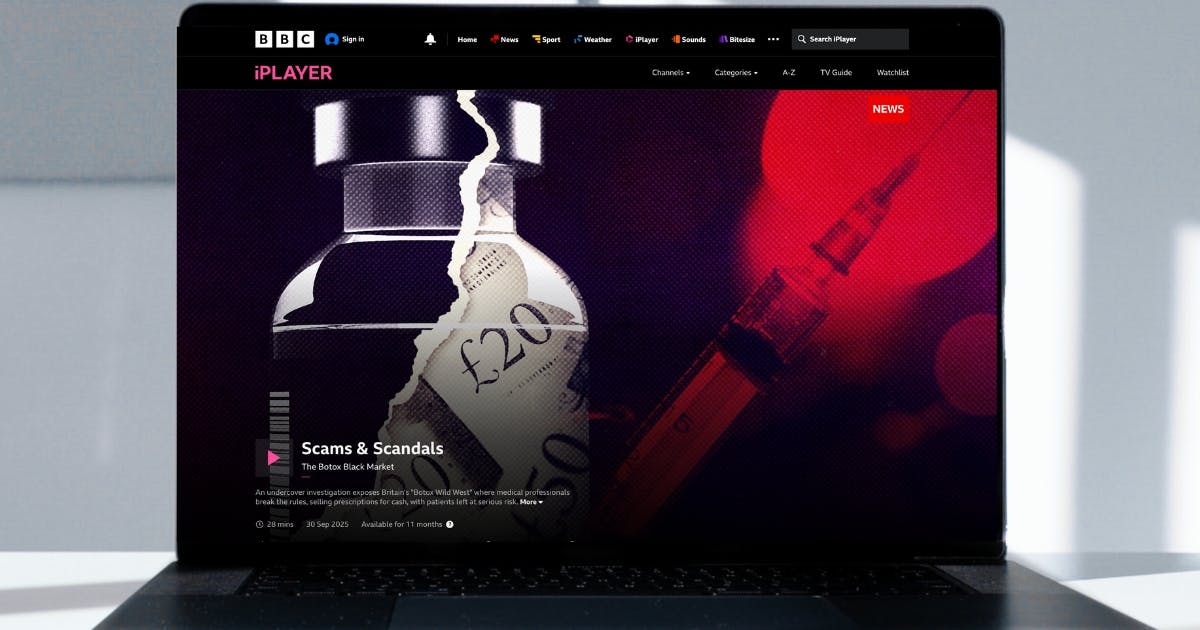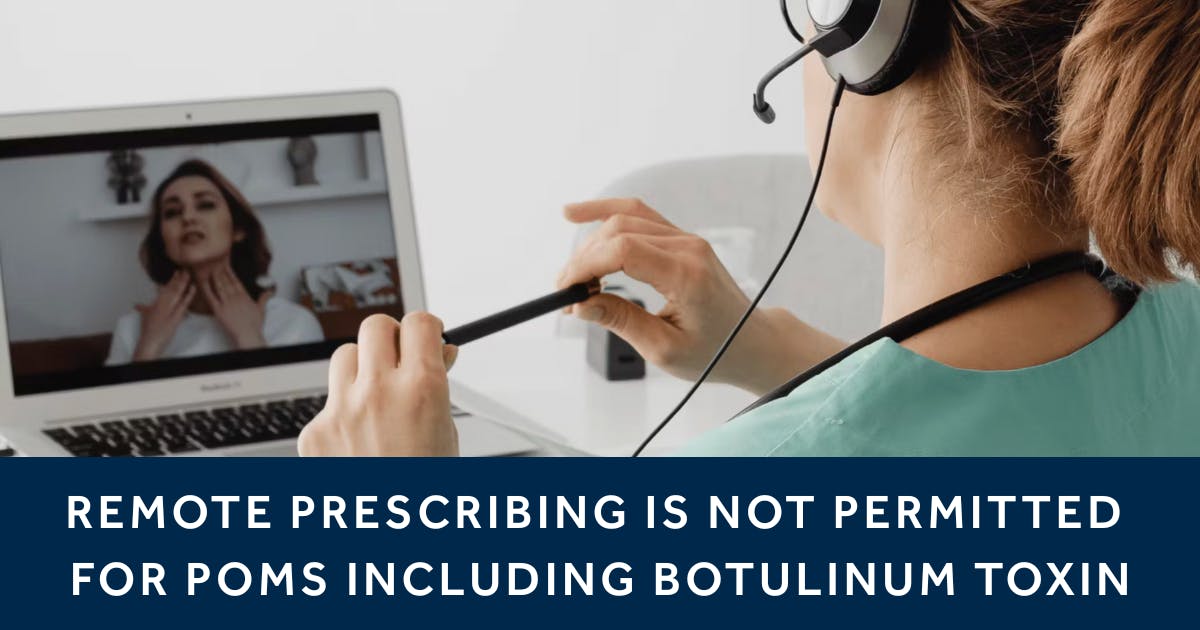Pharmacists Illegally Supplying Botox: Investigation & Consultation

The General Pharmaceutical Council (GPhC) has confirmed it’s launching a formal investigation into the illegal supply of Botox. This is in response to a BBC exposé which found pharmacists prescribing botulinum toxin to non-medic aesthetic practitioners.
Such a serious breach of professional standards jeopardises patient safety and is a welcome response to the BBC’s findings.
This has come at the same time as the UK is holding a public consultation into the safety and quality of care for people accessing medications through private prescriptions. You have until 4th November 2025 to contribute your thoughts so scroll down to find out more…

BBC investigation exposed nurses and pharmacists
On 30th September 2025, the BBC aired its undercover documentary, ‘The Botox Black Market’ as part of its ‘Scams & Scandals’ series. You can watch it on iPlayer until September 2026.
The investigation revealed both nurses and pharmacists offering to issue prescriptions for botulinum toxin for non-medics and without face-to-face consultations. Not only did this breach the prescribing requirements for prescription only medications (POMs), but the toxins were Korean products that are illegal in the UK.
Face-to-face prescribing consultations are mandatory
In person, face-to face prescribing, not remote - online - consulting, is mandatory for anyone prescribing botulinum toxin in England. This is standard practice for medical professionals registered with the:
- GPhC - General Pharmaceutical Council
- GMC - General Medical Council
- GDC - General Dental Council
- NMC - Nursing & Midwifery Council.
In one of the cases aired, a pharmacist accepted payment and handed over Botox vials without ever seeing the patient in person.
Another instance showed the undercover researcher being instructed to falsify medical records to make it appear as if a consultation had taken place.
Prescribing botulinum toxin for use by non-medic injectors
The undercover report showed some pharmacists offering to prescribe botulinum toxin to non-medically qualified individuals. The BBC revealed that these non-medics were offering botox injections to the public, and used pharmacists to knowingly facilitate their supply of toxin.
This practice breaches fundamental prescribing and professional standards. It is illegal for botulinum toxin - again, a prescription-only, restricted medication - to be supplied:
- Without a face-to-face, in-person consultation by a prescriber for each named patient, every time they require a new prescription
- For administration by anyone other than an appropriate healthcare professional under that prescription.
When pharmacists issue prescriptions or supply products to non-medics who go on to inject patients, they are not only acting outside their professional remit. They’re also enabling unregulated, unsafe practice and, arguably, bringing the specialty of aesthetic medicine into disrepute.
The Royal Pharmaceutical Society (RPS) has warned pharmacists not to compromise on these legal safeguards for the supply of prescription-only medicines.
Although aesthetic nurse prescribers were also caught trading botox prescriptions with non-medics during the BBC sting, the NMC has not made an official statement yet. It is, however, likely that any members caught breaking the law in this way will face sanctions.

GPhC investigation into pharmacists illegally prescribing botox
The General Pharmaceutical Council (GPhC) confirmed on 30th September 2025 that this conduct will be formally investigated.
Dionne Spence, GPhC Chief Enforcement Officer, advised that the BBC’s findings were “very concerning”. She confirmed that enforcement action will follow where there is evidence of illegal prescribing or supply.
In a statement published to the GPhC website, it was noted that the organisation had requested further details from the BBC as part of this inquiry.
“Our guidance is clear that when providing non-surgical cosmetic medical products such as Botox, there needs to be a physical examination of the person to support a safe prescribing decision,” she reiterated.
Adding, “We work very closely and proactively with the other regulators that are also involved in regulating online prescribing services, including the Care Quality Commission, to share intelligence and to take a joined-up approach to investigations.
“We are also working with governments and policy makers to identify how the legal and regulatory framework in this area could be strengthened and any legislative gaps could be addressed; including by contributing to the DHSC’s call for evidence on private prescribing.”
Share your views on private prescribing in DHSC consultation
A public consultation is currently underway, which examines private prescribing in the UK. This is being held by the Department of Health & Social Care (DHSC) and is supported by the Cheif Pharmaceutical Officers for England, Scotland, Wales and Northern Ireland.
Entitled the ‘Private (non-NHS) Prescribing: Call for Evidence Document’, the DHSC explains that, whilst the NHS benefits from a range of ‘checks and balances’, the state of private prescribing requires further investigation.
Its key areas of exploration are listed as:
- Prescriptions written by prescribers registered in the European Economic Area (EU countries, Iceland, Liechtenstein and Norway) and Switzerland, that are dispensed in the UK
- Private prescriptions written by UK prescribers
- Medicines accessed through patient group directions (PGDs) outside of the NHS.
And the goal is to establish the public’s sentiments surrounding the impact the above routes of prescribing and supply have on the:
- Safety of people accessing medicines
- Quality of care that people receive.
The consultation also states that the DHSC wants to ‘ensure that the current system remains fit for purpose and enables patients’ to:
- Be treated by the most appropriate healthcare professional
- Safely and quickly access high-quality medicines they need through all legal routes in the UK.
This includes welcoming questions and feedback on oversight and regulation, patient safety and access to medicines, and quality of care in relation to non-NHS prescribing.
Have your say on pharmacists and aesthetic nurses holding stock
Whilst not it’s primary intention, this consultation offers a prime opportunity for pharmacists and cosmetic nurses - and cosmetic nurse prescribers, in particular - to feed back about the issue around ‘holding stock’.
In England, pharmacists and aesthetic nurses - even with the relevant prescribing qualification - cannot hold stock of prescription medications. For aesthetic practitioners, this includes botulinum toxin and hyaluronidase, the medication used to dissolve dermal filler.
Given various prescription-only medicines are used in emergency situations, as part of complications management protocols, there is growing concern that certain clinicians do not have immediate access to these.
At the moment, they need to work with an appropriate prescriber and rely on their short-notice availability to conduct a face-to-face consultation, in the case of an emergency.
The Joint Council for Cosmetic Practitioners (JCCP) and British Association of Medical Aesthetics Nurses (BAMAN) have been campaigning for a change to the relevant Act, to allow appropriately trained and qualified aesthetic nurse prescribers to be able to hold stock for emergency use.
To share your views, complete the consultation’s online form by 4th November.
Prescribing for other aesthetic practitioners
For medical aesthetic practitioners, the disturbing situation highlighted by the BBC reinforces the need to be uncompromising in upholding professional standards.
As a prescriber, you must never prescribe or delegate prescribing for non-medic injectors. Nor should you supply botulinum toxin, nor other prescription-only medications, through third parties outside the legal chain of custody.
As we’ve already hammered home, face-to-face, in-person prescribing is legally required. Online consultations will not suffice.
If you suspect inappropriate prescribing is happening, report the prescriber to the GPhC. Non-medic injectors being supplied with botox in order to treat patients should be reported to the Medicines and Healthcare products Regulatory Agency (MHRA) through the Yellow Card scheme. This is also where any products suspected of being illegal or fake can be reported.
Ultimately, this issue goes beyond pharmacy regulation. It’s about protecting patients and preserving the integrity of aesthetic medicine.
How does this fit with current aesthetics regulation proposals?
When non-medics gain access to prescription toxins through opaque supply chains, the lines between ethical medical practice and unregulated cosmetic enterprise blur. This then risks damaging public trust.
The standards within our specialty need to be rigorously upheld as a legitimate medical discipline, not a marketplace for unqualified injectors. With aesthetics regulation set to take small steps forward with the next public consultation, said to be planned for early 2026, setting clear boundaries and benchmarks will be a welcome, and long overdue, move.
This GPhC investigation could mark a turning point in how aesthetic prescribing is policed. If the regulator finds breaches, it may impose sanctions, conditions, or removal from its register. That sends a signal that cosmetic medicine is not exempt from regulatory rigor.
Non-medics’ access to botox
This case also strengthens the argument for nationally mandated licensing or registration for all injectors.
Professional bodies have long called for this to prevent rogue, unsupervised practices in non-surgical aesthetics. The public must know that cosmetic injections are delivered only under accountable medical governance - which is at odds with what is currently being proposed.
With non-medics being set to become eligible to practice injectables including filler and botox in England and Scotland after having completed a yet-to-be-determined aesthetics qualification, these governments will need to define how this will work.
How will a non-medic who gains an aesthetic practitioner licence which allows them to inject botulinum toxin access the necessary prescription medication? In addition to a prescriber, they’ll also need clinical oversight from a responsible healthcare professional.
As non-medics are not answerable to any professional board, the onus will likely fall on the prescriber and supervising clinician to ensure safe and ethical practice. This is something we look forward to seeing fleshed out more in the next stage of the aesthetics regulation and licensing scheme proposals. It’s also something worth highlighting in responses to the aforementioned ‘private prescribing’ consultation.
What steps aesthetic practitioners should take now
In terms of ensuring you are fully legally compliant and practising in line with the regulations and codes of your professional board, there are five steps aesthetic practitioners can take.
- Review your prescribing and supply practices. Confirm that every prescription follows a full, in-person clinical assessment
- Verify your supply chain. Ensure all products are obtained via regulated wholesalers or manufacturers with full documentation
- Document rigorously. Record clinical findings, patient history, and justification for toxin use in a detailed medical record
- Refuse questionable requests. If someone asks you to issue prescriptions without examination, or to supply to non-medics, decline and document the refusal
- Support professional regulation. Advocate for stricter oversight, licensing, and accountability in the wider aesthetics sector. You can highlight any concerns regarding non-medics accessing botulinum toxin under the proposed regulatory plans via both the current UK private prescribing consultation, and the forthcoming separate aesthetics regulation public consultations for England and Scotland.
All information correct at time of publication
Download our full prospectus
Browse all our injectables, dermal fillers and cosmetic dermatology courses in one document
By submitting this form, you agree to receive marketing about our products, events, promotions and exclusive content. Consent is not a condition of purchase, and no purchase is necessary. Message frequency varies. View our Privacy Policy and Terms & Conditions
Attend our FREE open evening
If you're not sure which course is right for you, let us help
Join us online or in-person at our free open evening to learn more
Our Partners













STAY INFORMED
Sign up to receive industry news, careers advice, special offers and information on Harley Academy courses and services


